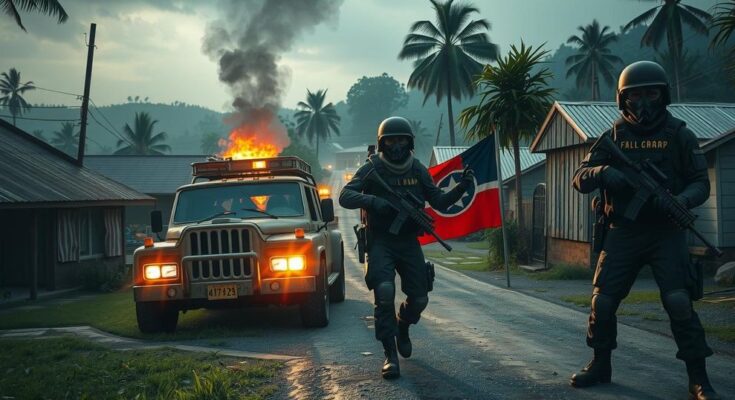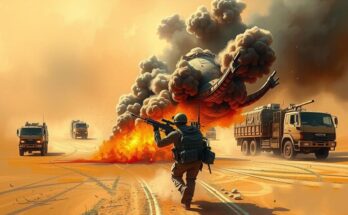Rwanda-backed M23 rebels have seized the town of Masisi in eastern DRC, marking their second town capture in two days amidst a humanitarian crisis in North Kivu province. The group has expanded its control since 2021, forcing numerous displacements. Efforts for mediation between DRC and Rwanda have stalled, while concerns over resource exploitation continue to surface.
Rebel forces supported by Rwanda have successfully seized control of the town of Masisi in the eastern Democratic Republic of Congo (DRC), marking the second significant territorial acquisition by the M23 group in just two days. This takeover occurs amidst ongoing conflict in the mineral-rich North Kivu province, where the M23 has expanded its hold since its resurgence in 2021, displacing hundreds of thousands of civilians. Angola has previously sought to mediate negotiations between President Félix Tshisekedi of the DRC and Rwandan President Paul Kagame, but these efforts collapsed last month.
Alexis Bahunga, a member of the North Kivu provincial assembly, expressed grave concern over the capture, stating it “plunges the territory into a serious humanitarian crisis” and urged for enhanced military support in the region. Meanwhile, residents reported that members of the M23 declared their aim to “liberate the country” during a meeting in Masisi. The Congolese government has yet to respond to the loss of this significant locality, which is home to approximately 40,000 residents and is located approximately 80 kilometers north of Goma, the provincial capital previously occupied by M23 forces in 2012.
The M23 also captured Katale, another nearby town, on the preceding Friday, heightening fears of their possible advance towards Goma, a city of two million residents. After a temporary lull in hostilities, fighting resumed in early December. Notably, Rwanda acknowledged a United Nations report from July indicating the presence of 4,000 Rwandan troops in support of the M23. Rwanda accuses the Congolese government of failing to address longstanding conflicts in eastern DRC and claims that they are collaborating with individuals linked to the 1994 Rwandan genocide against ethnic Tutsis and moderate Hutus.
The M23 emerged as a faction of another rebel group in 2012, ostensibly to protect Tutsis in eastern DRC, who have faced persecution. However, critics of Rwanda assert that the M23 is primarily engaged in smuggling eastern DRC’s valuable resources, such as gold and cobalt, utilized in technology and battery production. Recently, the DRC government announced its intent to sue Apple over the exploitation of these so-called “blood minerals,” which prompted the corporation to cease sourcing from the region.
The conflict in the eastern Democratic Republic of Congo has deep historical roots, marked by cycles of violence and instability often fueled by external influences, particularly from neighboring countries like Rwanda. The M23 group, originally formed to respond to grievances of the Tutsi population, has garnered international scrutiny due to accusations of furthering its agenda through violence and resource plundering. The region is rich in various minerals critical to global industries, making it a focal point of conflict. Efforts at mediation, such as those by Angola, have faced significant challenges, reflecting the complex political dynamics at play. Understanding the humanitarian implications of the violence, alongside the geopolitical interests involved, is crucial for comprehending the ongoing turmoil in eastern DRC.
In summary, the capture of Masisi by Rwanda-backed M23 rebels underscores an alarming escalation in the ongoing conflict in eastern DRC. The situation not only raises humanitarian concerns, as voiced by local leaders, but it also reflects the broader geopolitical tensions involving regional powers and their vested interests in the resource-rich areas of the DRC. With mediation efforts faltering and violence resuming, the outlook for peace remains bleak, necessitating urgent international attention and action.
Original Source: www.bbc.com




